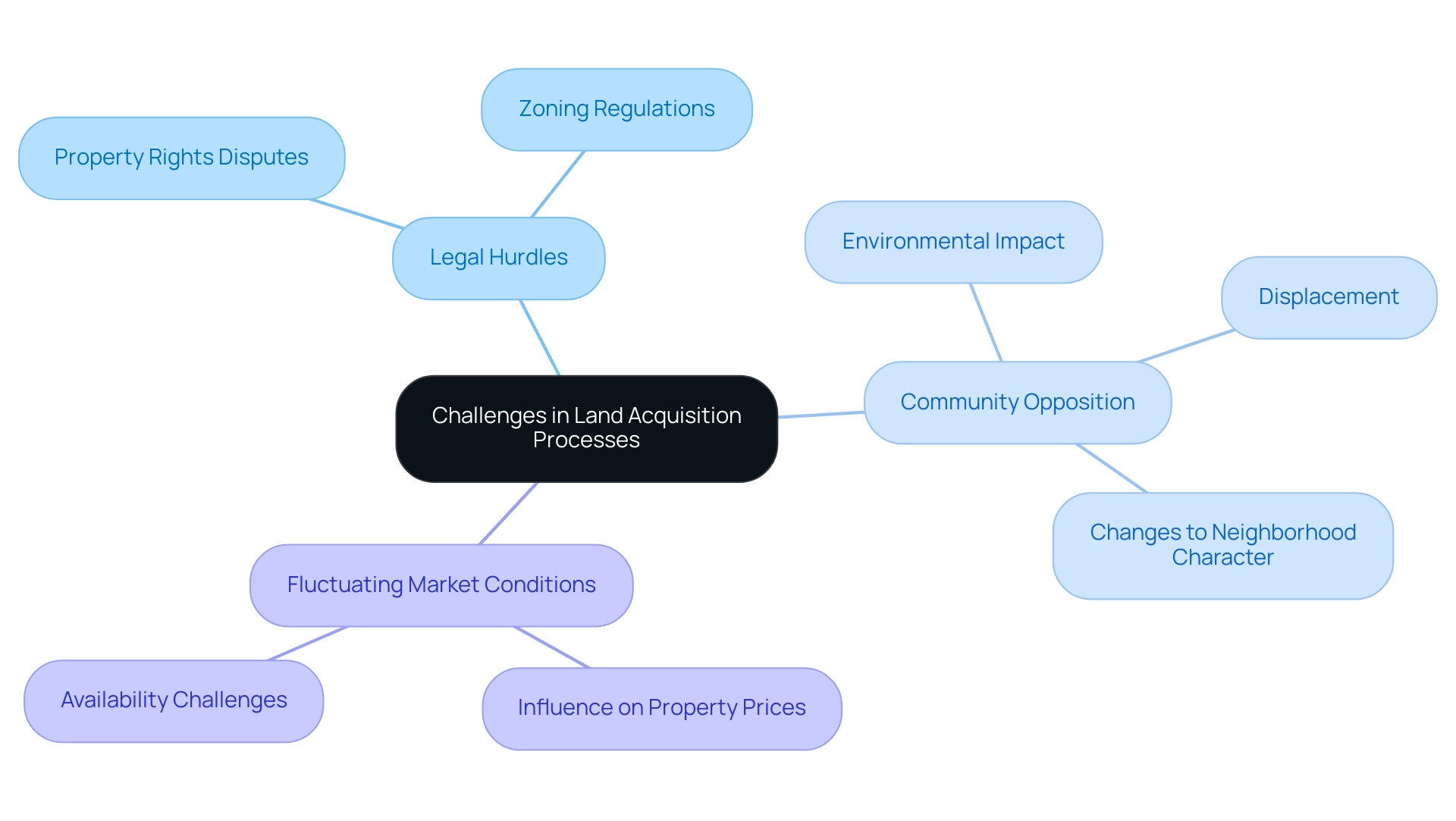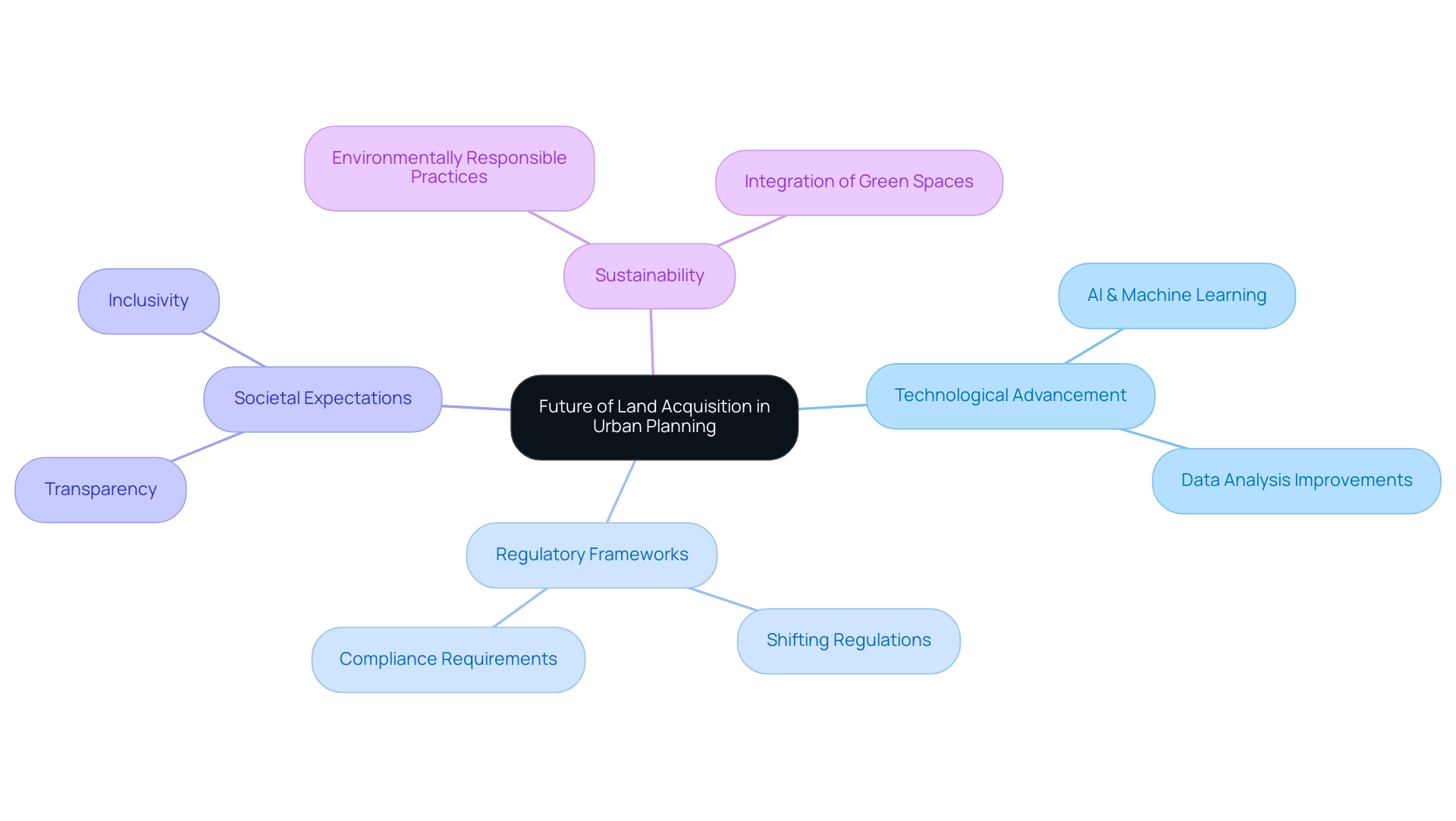Introduction
The process of land acquisition stands as a cornerstone of urban planning, essential for facilitating various development initiatives, from housing to infrastructure. As cities expand and populations grow, the need for effective land acquisition strategies becomes increasingly critical. This intricate process involves not only the negotiation with landowners but also the navigation of complex legal frameworks and the consideration of community sentiments.
Challenges abound, including:
- Legal disputes
- Community opposition
- Fluctuating market conditions
All of which can hinder timely development. However, by implementing best practices such as:
- Thorough due diligence
- Stakeholder engagement
Urban planners can enhance their effectiveness in securing land. Looking ahead, the future of land acquisition will likely be influenced by technological advancements and a shift towards sustainable practices, necessitating a proactive approach to meet the evolving demands of urban environments.
Defining Land Acquisition: A Key Component of Urban Planning
Land procurement is a critical process in securing land for various purposes, including residential, commercial, and infrastructure development. Its importance in city planning cannot be overstated, as it directly influences the feasibility and success of development initiatives. The procurement process typically involves negotiating with landowners, navigating complex legal frameworks, and addressing the concerns of local communities.
As the proverb states, 'The ideal moment to purchase a house is consistently five years prior,' emphasizing the significance of prompt property decisions in city planning. Effective land acquisition strategies for obtaining property are essential, especially in urban settings where availability is limited and competition for attractive locations is fierce. The case study on 'Youth Leadership in India' illustrates how effective property procurement can empower communities and drive growth, reflecting a broader vision for development.
As Michael Ferrara aptly stated,
Success in real estate starts when you believe you are worthy of it.
This conviction is crucial not just for individuals but also for organizations aiming to participate in successful property procurement. By nurturing a culture of worthiness and proactive engagement, city planners can develop a land acquisition strategy to obtain the necessary plots that facilitate growth, development, and the optimal provision of public services.
To further enhance this discussion, including more expert quotes or insights on property procurement strategies would offer a more thorough perspective on the subject.
The Strategic Importance of Land Acquisition in Urban Development
Securing property plays a crucial role in city development by allowing planners to obtain space for vital projects such as housing, transportation, and public facilities. A clearly outlined land acquisition strategy can streamline the property procurement process, reduce expenses, and minimize delays related to securing necessary territory. Furthermore, the land acquisition strategy involves considering future growth trends, zoning laws, and local requirements to ensure that development is sustainable and in harmony with regional goals.
By efficiently overseeing property procurement, urban planners can enable the prompt provision of essential infrastructure and services, ultimately improving the quality of life for residents and fostering economic growth within the area.
Challenges in Land Acquisition Processes
The property procurement process is fraught with challenges, including:
- Legal hurdles
- Community opposition
- Fluctuating market conditions
Legal issues may arise from disputes over property rights or zoning regulations, which can delay or complicate purchasing efforts. Community opposition can stem from concerns over:
- Environmental impact
- Displacement
- Changes to neighborhood character
Additionally, market conditions can influence property prices and availability, making it challenging for planners to secure sites at reasonable costs. To navigate these challenges, effective communication with stakeholders, thorough market analysis, and strategic negotiation techniques are essential.

Best Practices for Effective Land Acquisition Strategies
To achieve successful property procurement, urban planners should adopt several best practices as part of their land acquisition strategy:
- Conduct thorough due diligence to understand the legal, environmental, and market context of the property.
- Engage with local stakeholders early in the process to address concerns and build support for the project.
- Utilize technology like GIS mapping to identify appropriate parcels and streamline the procurement process.
- Develop clear negotiation strategies that prioritize win-win outcomes for both the organization and landowners.
By applying these best practices, city planners can improve their land acquisition strategy to acquire the essential property for development projects while nurturing positive connections with the public.
The Future of Land Acquisition in Urban Planning
The future of property procurement in city planning is expected to be influenced by technological progress, shifting regulatory frameworks, and developing societal expectations. Emerging technologies such as AI and machine learning are improving data analysis abilities, enabling more informed decision-making in property procurement. Additionally, as communities increasingly demand transparency and inclusivity in planning processes, city planners will need to adapt their strategies to engage with stakeholders more effectively.
Moreover, as sustainability gains importance, property procurement strategies will increasingly emphasize environmentally responsible practices and the integration of green spaces. By anticipating these trends, urban planners can position themselves to successfully navigate the future landscape of their land acquisition strategy.

Conclusion
The intricate process of land acquisition remains a fundamental element of urban planning, crucial for facilitating a wide range of development initiatives. As cities continue to grow, the importance of effective land acquisition strategies becomes increasingly evident. From negotiating with landowners to navigating legal complexities and addressing community concerns, urban planners must employ a multifaceted approach to secure land for residential, commercial, and infrastructure projects.
Challenges such as legal disputes, community opposition, and fluctuating market conditions can significantly impede the acquisition process. However, by embracing best practices—including thorough due diligence and proactive stakeholder engagement—urban planners can enhance their effectiveness. These strategies not only streamline the acquisition process but also foster positive relationships with local communities, ultimately leading to successful development outcomes.
Looking ahead, the future of land acquisition is poised to evolve in response to technological advancements and a growing emphasis on sustainability. The integration of innovative tools and techniques will enable urban planners to make more informed decisions, while a commitment to environmentally responsible practices will align development initiatives with community expectations. As the landscape of urban development continues to change, a proactive and adaptable approach to land acquisition will be essential for meeting the needs of dynamic urban environments.
Frequently Asked Questions
What is land procurement and why is it important in city planning?
Land procurement is the process of securing land for various purposes such as residential, commercial, and infrastructure development. It is crucial in city planning as it directly impacts the feasibility and success of development initiatives.
What are the main challenges faced during the property procurement process?
The main challenges include legal hurdles, community opposition, and fluctuating market conditions. Legal issues may involve disputes over property rights or zoning regulations, while community opposition can arise from concerns about environmental impact, displacement, and changes to neighborhood character.
How can urban planners streamline the property procurement process?
Urban planners can streamline the process by developing a clearly outlined land acquisition strategy that considers future growth trends, zoning laws, and local requirements. This approach helps reduce expenses and minimize delays in securing necessary territory.
What best practices should urban planners adopt for successful property procurement?
Best practices include conducting thorough due diligence, engaging with local stakeholders early, utilizing technology like GIS mapping, and developing clear negotiation strategies that prioritize win-win outcomes.
How does community engagement impact property procurement?
Engaging with local stakeholders early in the process helps address concerns and build support for development projects, which can facilitate smoother property procurement and reduce community opposition.
What role does technology play in the future of property procurement?
Emerging technologies such as AI and machine learning are enhancing data analysis capabilities, allowing for more informed decision-making in property procurement. Technology will also help planners adapt to shifting regulatory frameworks and societal expectations.
How are sustainability and environmental practices influencing property procurement strategies?
As sustainability becomes increasingly important, property procurement strategies are expected to emphasize environmentally responsible practices and the integration of green spaces, aligning development with community values and environmental goals.
List of Sources
- Defining Land Acquisition: A Key Component of Urban Planning
- Top 28 Most Powerful Real Estate Investing Quotes (https://garrettsrealty.com/blog/real-estate-investing-quotes.html)
- SC says land acquisition for "public purpose" is justified (https://m.economictimes.com/news/politics-and-nation/sc-says-land-acquisition-for-public-purpose-is-justified/articleshow/3455010.cms)




